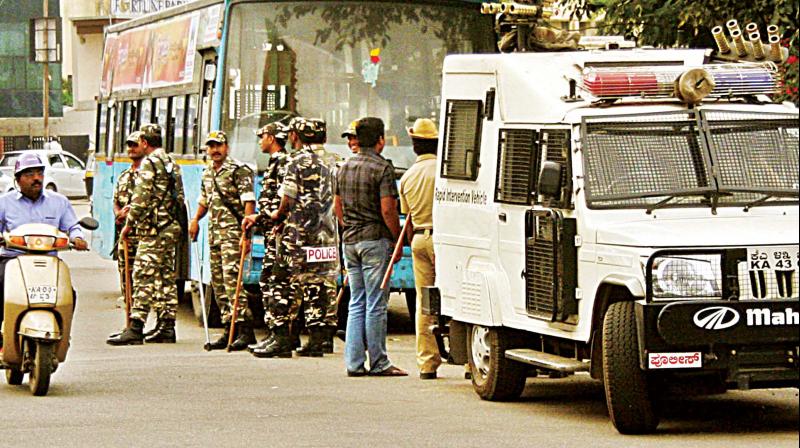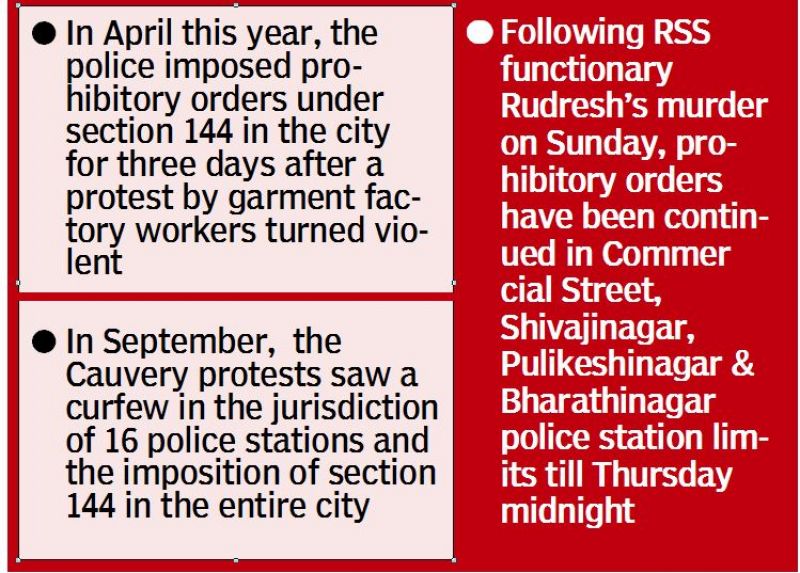BANgalore, not the city we know
The RSS worker belonged to the Tamil speaking Yadava community, which has been a part and parcel of the city for hundreds of years.

Frequent incidents of violence, protests and now, a murder, have taken a heavy toll on Brand Bengaluru. Over the last two months, the police have clamped prohibitory orders repeatedly, robbing people of a sense of security. Though the ban order under Section 144 does not directly affect normal life, it certainly has sent a message to the outside world that all is not well with the IT Capital of the country.
The city has had a volatile year with a protest by garment factory workers turning violent in April, followed by the Cauvery riots that saw buses and other vehicles go up in smoke in September. And now the murder of an RSS worker has led to tension in parts, forcing the police to impose prohibitory orders in Commercial Street, Shivajinagar, Pulikeshinagar and Bharathinagar police station limits till Thursday midnight.
In fact, the police has clamped prohibitory orders in the city at least five times over the last six months for various reasons. The gravity of such action hit home particularly during the Cauvery violence, when curfew was declared in 16 police station limits, and prohibitory orders were imposed all over the city.
Read: Imposing prohibitory orders not wise choice
If the frequency with which section 144 has been invoked this year to restore calm has proved disquieting to Bengalureans accustomed to peaceful living, could it impact its image among tourists and even investors? Ask Federation of Karnataka Chambers of Commerce and Industry (FKCCI) president, M C Dinesh, and he acknowledges that the law and order situation in the city is a cause for concern. "It is the responsibility of everyone to protect the city’s brand image. We need to ensure that the law and order situation is good in the city. The police and the intelligence department need to work hard on this," he stresses.
And Prof. S R Keshava of the Bengaluru University’s Department of Economics, warns that a bad law and order situation can affect FDI flow into the city. “The state government recently held a global investors’ meet, but if we are not able to maintain law and order, all the promises made by the investors may remain on paper. Murder, protests and agitations don’t send the right signal to anyone. We need to have peace in society,” he underlines, noting that Brand Bengaluru can do without such negativity as it currently manages to attract 13 per cent of the FDI coming into the country.
As for brand guru, Harish Bijoor , he says each time there has been even limited use of section 144 in the city, it has signalled to investors, corporate outfits and tourists alike that things are not fine and this could harm Bengaluru's image in the long run.
But defending such stern police action in times of trouble, former DG and IGP, S.T. Ramesh contends that if it doesn’t take precautions on these lines there could be more violence, which may impact the city’s image greatly. “Its the duty and responsibility of the police to maintain law and order at any cost, and use of prohibitory orders is just one such tool. The Cauvery was an emotional issue that had the potential to create clashes among people on linguistic grounds. And the recent murder of an RSS man has the potential to create communal tension. So the police are justified in clamping prohibitory orders,” he reasons.
A senior police officer also notes that imposing prohibitory orders is just a preventive step. “It may signal that something is not right in the city. But our primary duty is to maintain law and order. If we don’t take such preventive steps, the damage could be even more serious,” he warns.
Rudresh laid to rest, family, friends mourn
RSS worker, Rudresh R’s final journey to the Kalpalli crematorium was through Kamaraj Road, where he was hacked to death on Monday by two unidentified men on a bike. The funeral procession stopped for a few moments at the spot where he was attacked and some prayers were said by his family and friends before it moved on to the crematorium near the Indiranagar police station. Over a 1000 personnel, including KSRP platoons and the Rapid Action Force (RAF) provided security in and around the Shivajinagar junction and along the route of the procession. Shivajinagar itself was deserted with shops downing their shutters in response to the prohibitory orders imposed by the police under section 144 of the CrPc. It was only after the final rites were conducted at the crematorium at around 5 pm that areas in and around Shivajinagar limped back to normalcy and BMTC buses resumed their services from the bus stand post 4 pm.
While the police had taken all precautions to prevent any outbreak of violence, members of a minority community were seen helping mourners and distributing water and other refreshments among them as hundreds of the RSS worker’s friends and relatives paid homage to him at his house near the Mariayamma temple in Shivajinagar where it was kept for public viewing earlier in the day even as the area around reverberated to the sound of ‘Om’ played on a loudspeaker. Former Deputy Chief Minister, R. Ashok and senior BJP leaders, Shobha Karandlaje and Katte Subramanya were among those who visited the family and Rudresh’s wife, Saraswathi Tuesday morning to condole his death.
The RSS worker belonged to the Tamil speaking Yadava community, which has been a part and parcel of the city for hundreds of years. “Our ancestors have been here for centuries and we have all been born and brought up in Bengaluru,” said Prakash Yadav, a cousin of Rudresh, adding, “We are in shock still. We don’t know why anyone would do this, but a few days ago somebody had threatened the Yadavas in our area after learning that Rudresh was progressing quite fast. We are waiting for the police to arrest the culprits and then will decide what to do next.”
According to another relative, Rudresh was very active locally in festivals, including the recent Ganesh Chaturthi. With the help of his relatives, who ran catering businesses and supplied milk, he would often supply food to such functions, sometimes free of cost. “We are over a dozen families in this area and Rudresh used to take care of us very well,” he said.


